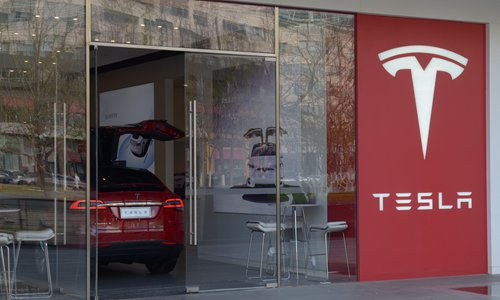
File photo
Chinese shoppers are joining a collective complaint against US electric vehicle maker Tesla as its Model 3 electric sedans manufactured in Shanghai were found to offer a lower performance than promised without notice. And, the shoppers demand a refund.Now, a rising number of Model 3 vehicle owners in China, disgruntled to find their cars are equipped with the old hardware - hardware version 2.5 (HW2.5) instead of HW3.0 as pledged by Tesla, plan to resort to the law to protect their interests, even though Tesla stated that it will replace the chips for free.
In a Weibo post on March 3, the carmaker said the swap was due to supply shortage of HW3.0 chips. With output climbing since its Shanghai Gigafactory's resumption on February 10, the company will replace the chips for the car-buyers.
Compared with HW2.5 chips made by Nvidia, the newer version is a self-developed computing platform by Tesla for its full self-driving (FSD) function, which has seven times the computing ability and 21 times the image handling ability of the former system, media reports said. The FSD function is optional when customers order Tesla cars that cost about 56,000 yuan ($8,064).
Also, Tesla's blaming the stealthy chip swap on disruption of supply chains amid the outbreak of coronavirus has angered Chinese customers.
"It should not be an excuse for Tesla to downgrade the chips without notifying us. It would be more understandable if Tesla informed us in advance. We can wait but we cannot be denied the truth," one owner in Shanghai, who asked to remain anonymous, told the Global Times on Wednesday.
"I won't accept Tesla's pledge to upgrade the chip, because it is a key component, and the replacement would involve machine or wire dismantling, which may cause safety hazards," the owner said.
The Ministry of Industry and Information Technology (MIIT) said on Tuesday that it has urged Tesla to ensure product consistency, quality and safety. It should keep its Chinese-made vehicles consistent, according to an MIIT statement.
Tesla's Gigafactory in Shanghai started to deliver Chinese-made Model 3 sedans in December last year with weekly capacity exceeding 3,000 units. In February, Tesla delivered a total of 3,958 vehicles to the Chinese market, taking up 30 percent of the nation's electric vehicle sales, data from the China Passenger Car Association showed.
Apart from home-made Model 3 sedan owners, imported Model 3 owners have also found evidence of hardware inconsistency, and they have also begun to safeguard their rights.
A Beijing-based white-collar worker surnamed Zhou told the Global Times Wednesday that unlike domestically made Model 3s, the certificate provided with the imported versions does not show specific configurations, which means evidence cannot be easily obtained.
Zhou had her imported Model 3 delivered in October last year.
"But I saw today some buyers have found a way: you can file an application with the MIIT and the department can help check configurations for you since Tesla put these on record at the department, and it turned out their cars have also found the inconsistency, " Zhou noted.
A services employee of Shanghai's Pudong New Area Administration for Market Regulation told the Global Times by phone Wednesday that it has received more than 10 complaints from imported Model 3 owners.
Tesla has infringed consumer's rights to know the facts due to its inability to fulfill its contract, but it still needs further evidence to prove that it took part in any fraudulent conduct, lawyers say.
Xu Hao, a lawyer at the Beijing-based Jingsh Law Firm, told the Global Times Wednesday that "with the preliminary evidence consumers have provided, we can only say that Tesla is suspected of fraud at the moment, not confirmed."

